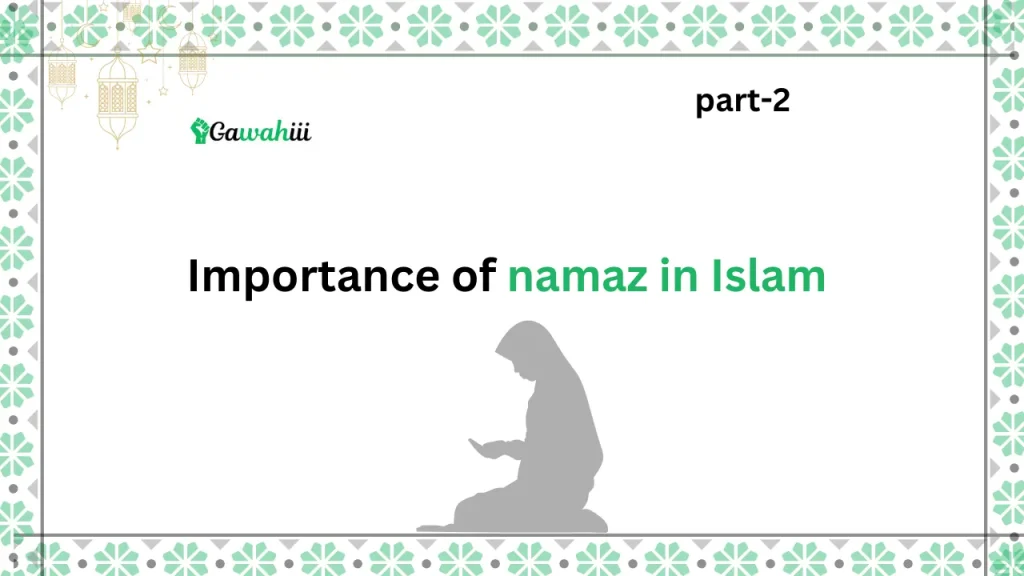
When a task is not done properly, the right results cannot be achieved. For example, if an ignorant person is sent to European factories to make a cell phone product or a car product from start to finish, it is obvious that he will not be able to produce the desired product. Similarly, the matter of prayer. For prayer to be accepted by Allah, it is necessary that we pray according to the Sunnah so that we can get the desired results. Today, there are many books in the market that are written on regular prayer. We should at least buy them and keep them with us.
Prayer from the Quran and Hadith:
Quranic verses:
“And establish prayer and pay zakat and bow with those who bow.” (Al-Baqarah 43) (5)
“Guard your prayers.” (Al-Baqarah 238) (6)
“So woe to those who are heedless of their prayers.” (Al-Ma’un 4,5) (7)
“And enjoin prayer on your family and be steadfast in it.” (Taha 132) (8)
“So establish prayer and pay zakat and be steadfast in it.” (Al-Hajj 78) (9)
Prophet’s Hadiths:
“The difference between a believer and an unbeliever is prayer.” (Ibn Majah) (10)
“Whoever does not guard his prayer, there is no light, no proof, and no salvation for him, and on the Day of Resurrection he will be with Qarun, Pharaoh, Haman, and Ubayy ibn Khalaf.” (Ahmad) (11)
“The first thing that will be brought to account on the Day of Resurrection will be prayer.” (Sunan Ibn Majah) (12)
“Prayer is the pillar of religion.” (Sunan Tirmidhi) (13)
Prayer times:
Fajr: From the dawn of dawn until sunrise.
Zuhr: From after sunset until the second half of the night according to Imam Abu Hanifa (may Allah be pleased with him) and until the first half of the night according to the companions (may Allah be pleased with him).
Asr: From the second half of the night according to Imam Abu Hanifa (may Allah be pleased with him) and from the first half of the night according to the companions (may Allah be pleased with him) until sunset. When the eyes are blinded by the sun, then the makruh time begins.
Maghrib: From sunset until sunset.
Isha: From sunset until sunrise. It is makruh to pray after midnight.
There are three makruh times for prayer, in which prayer should be avoided:
From the beginning of sunrise until the sun shines so much that the eyes begin to shine.
When the sun passes the line of zenith.
When the sun shines so much that the eyes are blinded by the sun, until the sun sets completely.
Rak’ahs of Prayer:
- Fajr: 2 Sunnah Mu’akkadah, 2 Fard. 4
- Zuhr: 4 Sunnah Mu’akkadah, 4 Fard, 2 Sunnah Mu’akkadah, 2 Nafl. 12
- Asr: 4 Sunnah Ghar Mu’akkadah, 4 Fard. 8
- Maghrib: 3 Fard, 2 Sunnah Mu’akkadah, 2 Nafl. 7
- Isha: 4 Sunnah Ghar Mu’akkadah, 4 Fard, 2 Sunnah Mu’akkadah, 2 Nafl. 3 Witr 2 Nafl –17
Reference:
The Quran, Surah Al-Ankabut (29), verse 45.
2 Al-Baqarah 43
2 Al-Baqarah 238
107 Al-Ma’un 4,5
20 Taha 132
20 Taha 132
«Sunan An-Nasa’i/Al-Salat 8 (464), Sunan Ibn Majah/Al-Iqamah 77 (1079) (Tahfat Al-Ashraf: 1960), and Musnad Ahmad (5/346, 355) (Sahih)»
Ahmad: 129/2, Hasan
Sunan Ibn Majah, Hadith: 1425
Sunan Tirmidhi, Chapter: Explanation of the Sanctity and Virtue of Prayer, Hadith No.: 2616
جب ایک کام درست طریقہ سے انجام نہ دیا جائے تو تب تک درست نتائج بھی حاصل نہیں ہو پاتے۔ مثلاً، ایک جاہل آدمی کو یورپ کی فیکٹریوں میں بھیج دیا جائے کہ وہ سیل فون پروڈکٹ بنائے یا کار پروڈکٹ سٹارٹ سے لے کر فنشنگ تک بنائے، تو ظاہر ہے کہ مطلوبہ پروڈکٹ وہ تیار نہیں کر پائے گا۔ اسی طرح نماز کا معاملہ ہے۔ نماز کا عند اللہ مقبول ہونے کے لیے لازمی ہے کہ ہم نماز سنت کے مطابق پڑھیں تاکہ ہمیں مطلوبہ نتائج حاصل ہو جائیں۔ آج مارکیٹ میں ایسی بہت سی کتابیں ملتی ہیں جو مستقل نماز پر لکھی ہوتی ہیں۔ ہمیں چاہیے کہ کم از کم وہ تو خرید کر اپنے پاس رکھ لیں۔
نماز ازروئے قرآن و حدیث سے:
آیاتِ قرآنی:
“اور نماز قائم کرو اور زکوٰۃ ادا کرو اور رکوع کرو، رکوع کرنے والوں کے ساتھ۔”( البقرۃ 43) (5)
“اپنی نمازوں کی حفاظت کرو۔” ( البقرۃ 238) (6)
“پس خرابی ہے ان نمازیوں کے لیے جو اپنی نمازوں سے غافل ہیں۔”( الماعون 4،5) (7)
“اور اپنے اہلِ خانہ کو نماز کا حکم دو اور خود بھی اس پر ثابت قدم رہو۔” (طٰہٰ 132) (8)
“پس نماز قائم کرو اور زکوٰۃ ادا کرو اور اللہ سے وابستہ ہو جاؤ ۔” ( الحج 78) (9)
احادیثِ نبویہ:
“مومن بندے اور کافر کے درمیان نماز کا فرق ہے”. (ابن ماجہ) (10)
“جو نماز کی حفاظت نہیں کرتا، اس کے لیے نور اور دلیل اور نجات نہیں ہے اور قیامت کے روز وہ قارون اور فرعون اور ہامان اور ابی ابن خلف کے ساتھ ہوگا” ۔ (احمد) (11)
“قیامت میں سب سے پہلے نماز ہی کا حساب ہوگا”. (سنن ابنماجہ) (12)
“نماز دین کا ستون ہے”. (سنن ترمذی) (13)
اوقات نماز:
فجر: طلوعِ صبح صادق سے طلوع شمس تک۔
ظہر: زوال کے بعد سے امام اعظم ابوحنیفہؒ کے نزدیک مثل ثانی تک اور صاحبینؒ کے نزدیک مثل اول تک۔
عصر: امام اعظم ابوحنیفہؒ کے نزدیک مثل ثانی سے اور صاحبینؒ کے نزدیک مثل اول سے غروب شمس تک۔ جب سورج کو دیکھنے سے آنکھیں چندھیانا بند ہو جائیں ، تب سے البتہ مکروہ وقت شروع ہو جاتا ہے۔
مغرب: غروب شمس سے غروب شفق ابیض تک۔
عشاء: غروب شفق ابیض سے طلوع شمس تک ۔ نصف رات کے بعد پڑھنا البتہ مکروہ ہے۔
تین اوقات نماز کے لئے مکروہ ہیں، جن میں نماز سے اجتناب جانا چاہئے:
طلوع شمس کی ابتداء سے اس قدر دھوپ آجانے تک کہ جب آنکھیں چندھیائی شروع ہو جائیں۔
سورج کے خط زوال سے گزرنے کے وقت ۔
دھوپ میں اس قدر زردی آجانے سے کہ جب آنکھیں چندھیانی بند ہو جائیں، سورج کے مکمل غروب ہو جانے تک۔
رکعات نماز :
فجر: 2 سنت مؤکدہ، 2 فرض۔ 4
ظہر: 4 سنت مؤکدہ، 4 فرض، 2 سنت موکدہ، 2 نفل ۔ 12
عصر: 4 سنت غیر مؤکدہ ، 4 فرض۔ 8
مغرب : 3 فرض، 2 سنت مؤکدہ ، 2 نفل ۔ 7
عشاء : 4 سنت غیر مؤکدہ، 4 فرض، 2 سنت مؤکدہ ، 2 نفل ، 3 وتر 2 نفل –17
Also read this :






